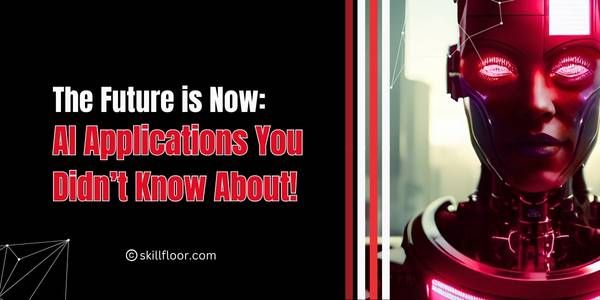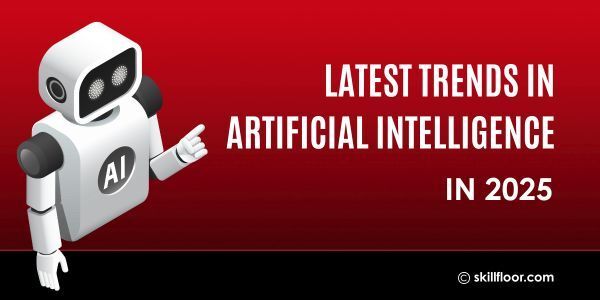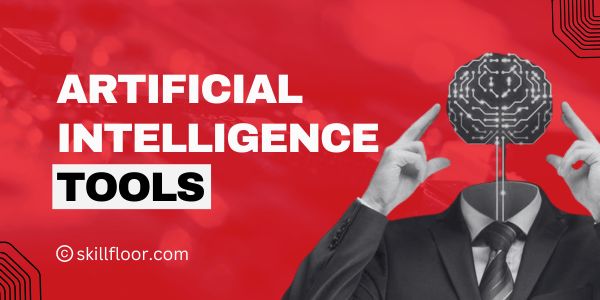Applications of Artificial Intelligence
What if AI could simplify your workflow? Explore how it can support your growth, without the stress or complexity.

When I first learned about Artificial Intelligence (AI) during my early career as a technology expert, I was both fascinated and careful. It seemed like something from a science fiction book that machines could simulate human decision-making. However, seeing its practical uses changed my viewpoint completely. Artificial intelligence has slowly been integrated into our daily lives, from intelligent assistants that help me in scheduling meetings to complex algorithms that predict weather patterns.
When was the last time you relied on a streaming service for movie suggestions or utilized navigation tools to discover the fastest route? These are real-world instances of how AI is changing how we live and work, not merely coincidental occurrences. For example, Google Maps helps millions of travellers every day avoid congestion by using AI algorithms to evaluate traffic trends and recommend the quickest routes in real-time. Similar to this, Netflix's AI-powered recommendation engine learns your viewing tastes and makes personalized movie or show recommendations, making it simpler to pick something you'll enjoy.
For more information: https://help.netflix.com/en/node/100639
Let's explore some practical uses for artificial intelligence and see how this innovative technology is changing industries and enhancing people's lives. AI is gradually improving customer service, healthcare, and finance by making tasks easier, quicker, and more effective. It's not just for the future; it's already occurring.
What Is Artificial Intelligence?
The simulation of human intelligence in machines that are designed to think, reason, and learn is known as artificial intelligence. It includes a variety of technologies that let machines carry out operations like pattern recognition, problem-solving, and decision-making that normally need human thought. AI systems benefit a wide range of sectors, including healthcare, banking, and more, by analyzing enormous volumes of data and seeing patterns.
Why Is AI Used?
The following are some of the reasons/benefits of artificial intelligence is used:
-
Increase Efficiency: AI helps businesses save time and money by automating repetitive processes.
-
Enhance Decision-Making: AI offers insightful information for well-informed decision-making by examining data trends.
-
Improve Accuracy: In jobs like financial analysis and diagnostics, machine learning techniques minimize errors.
-
Expand Accessibility: AI provides essential services to those groups access through educational resources and virtual health attendants.
These advantages help to explain why AI technologies are being quickly adopted by companies all around the world.
What are the Applications of Artificial Intelligence?
The idea of artificial intelligence (AI) is no longer science fiction and is already a part of everyday life. Its wide range of uses, from entertainment to healthcare, is transforming both how people use technology and how industries function. So, how do the applications of artificial intelligence get used in the real world? Let's explore 10 important areas where AI has a big influence:

-
Healthcare: Improving virtual health support, medicine discovery, and diagnostics.
-
Transportation: supplying energy to self-driving cars, streamlining traffic, and enhancing logistics.
-
Education: Simplifying grading and personalizing instruction.
-
Retail: Improving inventory control and making customized recommendations.
-
Agriculture: Making mechanized harvesting and precision farming possible.
-
Finance: Automating trading, identifying fraud, and offering customized guidance.
-
Entertainment: Producing material and making recommendations to provide personalized user experiences.
-
Environmental Conservation: Environmental conservation includes energy efficiency, climate trend forecasting, and animal monitoring.
-
Security and Surveillance: Utilizing cybersecurity and facial recognition to improve safety.
-
Customer service: Using virtual agents and chat interfaces driven by AI to help businesses.
AI in Healthcare
The healthcare industry is one of the most significant real-world uses of artificial intelligence. AI-powered solutions are helping doctors, enhancing patient outcomes, and boosting diagnostics. For example:
-
Medical Imaging: X-rays and MRIs are among the medical images that are being analyzed by AI systems. Doctors can gain important insights from tools like Google's DeepMind, which have demonstrated remarkable accuracy in the early detection of illnesses like breast cancer.
-
Drug Discovery: The conventional method of finding new drugs can take years. By evaluating chemical molecules and forecasting their efficacy, AI speeds this up. AI-powered platforms played a crucial role in the development of vaccines during the COVID-19 epidemic.
-
Virtual Health Assistants: Applications such as Babylon Health and Ada Health employ artificial intelligence (AI) to offer health monitoring, symptom checks, and advice, enabling access to healthcare even in remote locations.
These developments show how AI helps medical practitioners save lives and increase productivity.
AI in Transportation
The transformation of transportation is yet another amazing use of artificial intelligence. Travel is becoming safer, quicker, and more effective because of AI-driven technologies. Among the examples are:
-
Self-Driving Cars: Businesses such as Waymo and Tesla are using artificial intelligence (AI) to develop self-driving cars that improve road safety and minimize human error.
-
Traffic management: To reduce congestion, AI-powered technologies analyze traffic patterns in real-time. For example, AI is used to optimize signal timing in smart traffic lights in cities like Los Angeles.
-
Logistics and Delivery: AI enhances delivery services' route optimization, ensuring prompt and economical transportation. AI is used by businesses like FedEx and UPS to optimize their processes.
AI in Education
The real-world uses of artificial intelligence are also becoming more visible in the field of education. AI technologies are enabling diverse learners to access education and personalizing the learning experience. Important examples consist of:
-
Personalized Learning: AI is used by platforms such as Khan Academy and Duolingo to modify information according to each learner's unique learning preferences and development.
-
Grading and Assessment: By more effectively evaluating assignments and tests, AI speeds up the grading process and saves teachers' time.
-
Virtual tutors: To help students understand difficult ideas, resources such as Carnegie Learning provide virtual tutoring.
AI in Retail
By enhancing customer service and simplifying corporate processes, artificial intelligence is changing the retail business. Here are a few major examples:
-
Personalized Recommendations: AI is used by e-commerce sites such as Amazon and Netflix to make show and product recommendations based on user preferences.
-
Inventory management: By forecasting demand patterns, AI-powered solutions guarantee ideal stock levels and cut down on waste.
-
Chatbots for Customer Service: Many shops use AI-powered chat interfaces to respond to consumer inquiries and give help 24 hours a day, seven days a week.
-
Fraud Detection: By seeing odd trends and stopping fraud, AI protects online transactions.
These apps boost business operational efficiency in addition to improving consumer satisfaction.
AI in Agriculture
Artificial intelligence applications are greatly assisting agriculture by providing ways to increase sustainability and productivity. Among the examples are:
-
Precision farming: AI-driven technologies analyze crop, soil, and weather variables to offer insights based on data. This helps farmers make well-informed planting and harvesting decisions.
-
Pest Control: AI systems are able to identify and predict pest infestations, allowing for prompt interventions and reducing crop losses.
-
Automated Harvesting: AI and robotics work together to help harvest crops more quickly and accurately.
AI in agriculture supports sustainable techniques and maintains food security as the world's population grows.
AI in Finance
One of the first fields to use artificial intelligence was the finance sector, which uses technology to improve customer service and decision-making. Applications in the real world include:
-
Fraud Detection: AI is used by banks and other financial organizations to spot odd transaction patterns and stop fraud.
-
Automated Trading: To increase profits, AI systems examine market trends and place transactions at the best periods.
-
Customer insights: AI-driven technologies help customers make well-informed investment decisions by offering tailored financial advice.
AI is empowering consumers and businesses by facilitating safer and more intelligent financial transactions.
AI in Entertainment
By providing personalized and interactive experiences, artificial intelligence is significantly influencing the entertainment sector. Among the examples are:
-
Content Recommendations: AI is used by streaming services like YouTube and Spotify to make recommendations for videos and music based on user preferences.
-
Game Development: By producing intelligent, responsive characters and dynamic settings, AI improves game experiences.
-
Content Creation: By automating the processes of video editing, script writing, and animation, AI-powered solutions help creators.
AI keeps people interested and content by providing personalized entertainment.
AI in Environmental Conservation
When it comes to solving environmental problems, AI is turning out to be a useful ally. Here are a few real-world examples:
-
Wildlife Monitoring: By examining patterns from video traps and sensors, AI systems monitor animal movements and safeguard threatened species.
-
Climate Change Modeling: AI predicts trends in the climate and aids in the creation of mitigation plans.
-
Energy Optimization: AI-powered smart grids better control electricity consumption, cutting waste and encouraging renewable energy.
These uses show how artificial intelligence might help create a more sustainable future.
AI in Security and Surveillance
Another important field where artificial intelligence applications are very effective is security. Among the examples are:
-
Facial Recognition: AI-driven security systems use facial recognition to instantly identify people and spot questionable activity.
-
Cybersecurity: AI tools proactively address threats and keep an eye on networks for any breaches.
-
Disaster Management: AI uses data analysis to forecast natural disasters and in the preparation of disaster response plans.
AI is improving global security by processing huge amounts of data quickly.
AI in Customer Service
AI is transforming customer service by increasing its speed and personalization:
-
Chatbots offer immediate, round-the-clock assistance for frequently asked questions.
-
Based on consumer data, personalized recommendations improve experiences (e.g., Amazon).
-
Automated ticketing facilitates quicker query resolution and prioritization.
-
Sentiment analysis identifies feelings and directs human agents to handle important problems.
-
Voice-based customer service is made possible by voice assistants such as Alexa.
Top 5 AI Apps
Siri (Apple): AI is used by Apple's Siri speech assistant to assist with task management, voice recognition, and controlling smart devices within the Apple ecosystem.
Google Assistant: Voice-activated search, task management, smart home control, and contextual responses are all features of this multipurpose AI assistant.
Amazon Alexa: It provides voice-activated shopping, music, and home automation, and it drives smart home appliances and connects with Amazon services.
Tesla Autopilot: With features like adaptive cruise control, lane-keeping, and enhanced safety, Tesla Autopilot uses artificial intelligence (AI) to drive semi-autonomously.
Spotify: Spotify's AI makes customized music and playlist recommendations based on your listening preferences.
Is Artificial Intelligence Limiting Human Application?
Although artificial intelligence (AI) presents amazing possibilities, some contend that by automating tasks that have historically needed human labor, AI may limit human capabilities. For instance:
-
Job displacement: Concerns about unemployment have been raised by the automation of repetitive tasks in sectors like manufacturing and customer service.
-
Over-Reliance: Humans' capacity for critical thought and problem-solving may be diminished by an over reliance on AI systems.
-
Ethics and Bias: If AI algorithms are not properly controlled, they may unintentionally perpetuate society biases, restricting inclusivity and justice.
However, proponents contend that by replacing repetitive activities, AI enhances human abilities and frees up humans to concentrate on strategic thinking and creativity.
Challenges and Ethical Considerations
Artificial intelligence has many real-world applications, but there are disadvantages as well. Careful thought must be given to issues including algorithmic bias, data privacy, and ethical issues. For example, protecting user data and making sure decision-making algorithms are transparent are crucial.
In addition, the effect of AI on jobs is a topic of continuous debate. Upskilling of the workforce is required as it disrupts established positions and opens up new options.
Artificial intelligence has a wide range of transformational applications in the real world that affect almost every part of our life. AI is opening the door to a more intelligent and effective future by transforming everything from healthcare and education to finance and transportation.
Addressing the ethical and societal implications of this technology is essential as we continue to investigate its possibilities. By doing this, we can ensure that AI will continue to be a vehicle for advancement and variety.
AI is a tribute to human creativity and the possibility of innovation because of its real-world applications and ability to address global issues. AI is still in its infancy, but its future seems to be as bit as interesting as its present.
































































